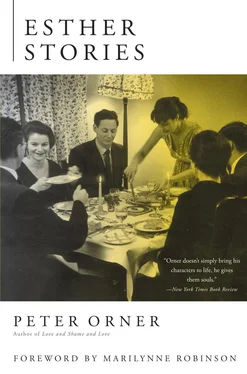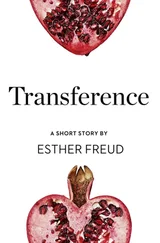At around 11:30, a guest happened to be looking out a window in Franklin’s den at the back, dark part of the house. A snooper, my grandmother said, the kind who creeps around the dark outskirts of a party and takes inventory of your silver, checks the labels under your cushions. She was the wife of one of Franklin’s lawyers, and she was looking out the back windows trying to estimate how much land Franklin owned between the house and the lake. She noticed a shadow in the empty pool.
“The orchestra was playing ‘Londonderry Air’ and just like that they cut off. But even so, it got louder, so much louder after the band stopped. So much much louder. ”
She was naked when they found her. This fact led to great speculation in the Chicago papers, involving, as a matter of course, the hired help of the caterer (especially two black waiters whose pictures were run in the Trib ) and the pawnbroker’s son, the infamous party-crasher, who, it was said, might have been driven wretched and murderous by the sight of what he could never have. (What the black waiters might have wanted with Paula Hirsch, nobody would say out loud.) It was also reported that Paula’s third-floor bedroom window was open, her fingerprints on the window handle. Her dress was neatly folded on the bed. Water and baking soda had been rubbed into the stain. The only thing askew in the room was a lamp found smashed on the rug.
“Nobody ever had much of a clue. Such a soft-spoken girl. But did she have friends? A busload of them came from out East for the funeral. I’m telling you, a busload crying their eyes out.”
Bunny Hirsch put her faith in the overturned lamp. “My daughter,” she announced from behind a black veil to the friends gathered at the house after the funeral, “was attacked and pushed out her own window. No one will ever be safe in their own homes again.” After the investigation dragged on for months, not a shred of new evidence was found. People started to say out loud what they hadn’t had the courage to say before: that Paula Hirsch had knocked the lamp over herself when she climbed up on the sill. But still the questioning continued. (“They drove Persky’s father out of business with all that suspicion,” my grandmother huffed. “And the blacks, God only knows what hell it was for them.”) Then people began to murmur that Franklin Hirsch had paid off the police in order to appease his now insane wife.
“All that red hair, but so so timid. Once, early on, her mother sent her away to camp to get her to talk more. A theater camp of some kind up in Michigan, near Charlevoix. Two weeks later the camp director wrote and told Bunny her daughter had a brilliant career ahead of her as a mime.” My grandmother laughed. “It was a routine letter; I used to get things like it all the time for Esther. Esther has a brilliant career ahead of her in tennis, Esther has a brilliant career ahead of her as a water-skier, a chef, a yeoman archer. Bunny and I drove up to Michigan to rescue Paula that afternoon. My daughter isn’t going to be anybody’s freak show. And Paula, as if she had a premonition we were coming, had on all that white makeup when we stuffed her in the car — she couldn’t have been more than nine or ten then. Bunny was so furious she couldn’t speak. But Paula and I did. We sat in the back together and laughed as I wiped her face with Kleenex that Bunny kept tossing back to us like plucked flowers.”
She stops on the narrow stairwell and listens to the trumpet, shoulders the wall in the dark, lingers to the slow murmur. The horn eases. She goes up again.
They were having tea on the patio. Bunny’s chair faced away from the swimming pool. It was three months after Paula’s death, July 1960. My grandmother had spent every morning with Bunny since the catastrophe, long after other friends went back to their lives and started whispering about how even in mourning Bunny Hirsch was a prima donna. But my grandmother remained her loyal lieutenant. My grandmother patted her head and stroked her neck and held her, absorbed Bunny’s tears and her fury. For hours on end out there, she listened, stroked. But that morning my grandmother said something else. She told me she couldn’t say exactly why she did it. But wasn’t she grieving also? Wasn’t Paula a daughter to her, too?
“We can’t know them, really, even our own flesh. Even our own daughters, Bun.”
Bunny Hirsch stood up and dropped her cup on the bricks — simply opened her hand and let it fall. She stood there with her fingers spread wide and faced the pool. Then she stalked into the house. A few moments later, while my grandmother was still kneeling and picking up the shards, the new maid came out and said Mrs. Hirsch was lying down and no longer felt well enough to entertain guests. Guest? She’d known Bunny five hundred years. They’d both started at Miss Rucker’s when they were six years old. How many numbers had they done together? The Piccadilly, Honor of Lady Elgin, the New Georgia Serenade, Iroquois Fire Dance, the Pica Pica, Sailor’s Hornpipe.
The palazzo has long been sold off, remodeled, subdivided into apartments. The trim’s been repainted an even brighter pink than it was in Franklin’s time. There’s a circular driveway now. The pool’s been filled in. It’s impossible to know it was there unless you know to look for the contours in the grass. A large sunken rectangle close to the house.
Earlier it had rained. She reaches out the window and rubs her hands on the outside of the pane, pulls them back inside. She rubs her face with the grimy water, her neck, her breasts, her stomach. Nothing now but sweet dizziness.
We are at our usual posts, sitting across from each other at the kitchen table. My grandmother cuts coupons from a stack of old newspapers. She’s wearing reading glasses so that the tip of her nose pokes out like a small bulb. She is tough. She still teaches a dance and exercise class for seniors, and anyone else who can keep up, on Wednesday and Friday afternoons at the rec center uptown. This is how I always think of her. Strong, but also tired. Not that far off from the way she looks in the old dance pictures, slinky and lovely, wrapped in a feather boa, wearing ruffled bloomers, one beautiful foot raised above her head. Because in those pictures there’s a tiredness that doesn’t match her scanty-clad showgirl poses. Her eyes look as if she’s fighting to close them — as if she already knows, as if she’s a mother with a lost daughter already.
“So Bunny never—”
“Never.”
“She just denied it? The entire time?”
“More than denial. Listen, Leo, there’s no mystery. That woman would rather her daughter had been violated and mutilated by a nutcase. She couldn’t tolerate a single thing out in the world that reflected badly on her. Especially the truth that she was a vile mother who drove that girl to the grave. Why else would Paula have done it like that? In front of all those people?” My grandmother pauses, snips a coupon. “ And she was jealous.”
“Of who?”
“Who do you think? Of me — for Esther.”
“We’re not talking about Aunt Esther.”
“Always. We’re always talking about Esther.”
“But Paula—”
“Bunny Hirsch was spared.”
“This was a girl who dove out a window and nobody had any idea why. You said it yourself to Bunny on the patio.”
“I watched my precious — tubes out her nose on a bed.” My grandmother rises. The scissors clatter to the table. “That woman never even sent a card.”
My Father in an Elevator with Anita Fanska, August 1976
HOT DAY. Anita Fanska. Sleeveless dress and hair wrapped up, intricately woven. Her head leaning forward looks like an attacking wicker picnic basket — and she wants him — and he most certainly wants her. Her sigh is more a moan. They’ve got eighteen floors to go. He says, The Fiskjohn matter, and she says, Yes, the Fiskjohn matter. My father’s voice changes, gets lower. He thinks it sounds like thunder. He rumbles. The letter with the changes has to go out by tomorrow noon at the absolute latest. He hopes reminding her that he’s the boss might make a difference to Anita Fanska. It doesn’t, and he knows it. Authority isn’t something she yields to — doesn’t matter that for the past seven years she’s been somebody’s secretary (my father’s for about a year now), and that earlier she was a Catholic schoolgirl taunting nuns. Even then people said Anita Fanska took what she wanted, which was zero from anybody, including the supposed Almighty, as she often reminded the Sisters. She wants my father not because he’s the boss and can make things simple for her, which is the reason he wants her to want him, but because he’s balding and not sure of himself, and ruddy-faced, and some days he’s handsome, and once he ran for the state legislature and got trounced but came into work the next day and said, breathed, Well, that’s over —he didn’t cry about it. He went back to work. She cried. Anita Fanska cried for two days; she wanted my father to be governor. She takes a step toward him, crowds him. He watches the floor numbers tick down.
Читать дальше












